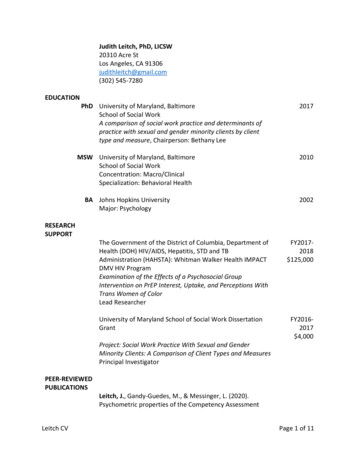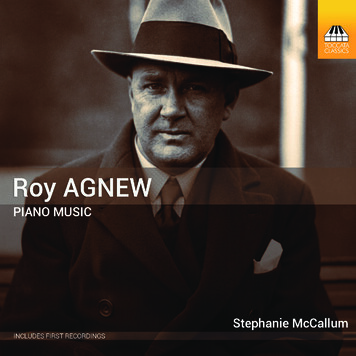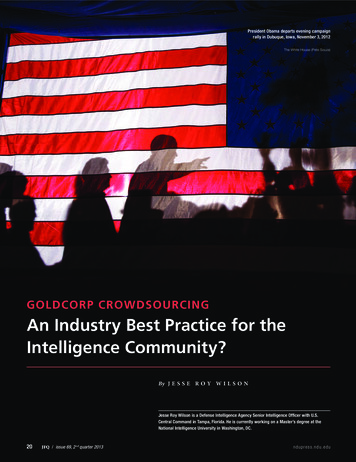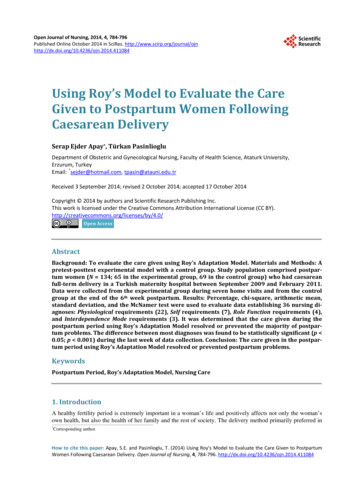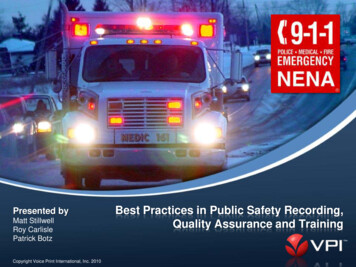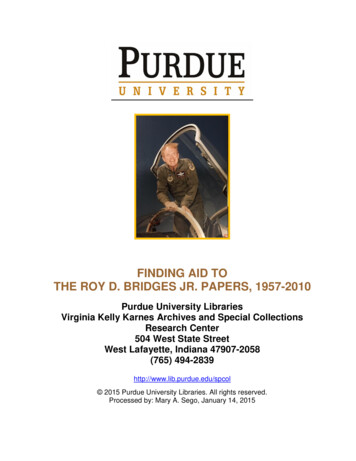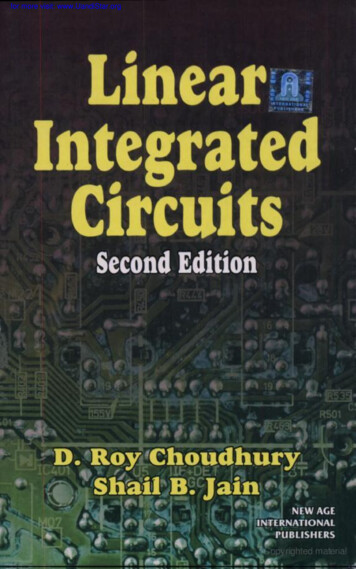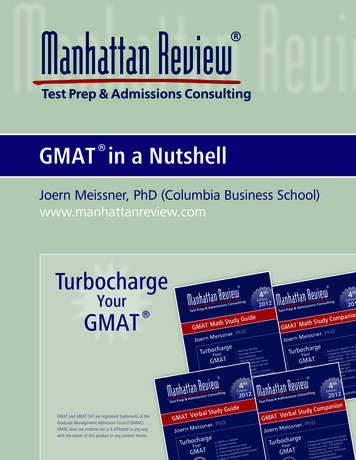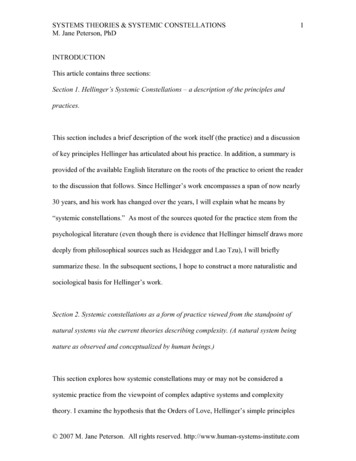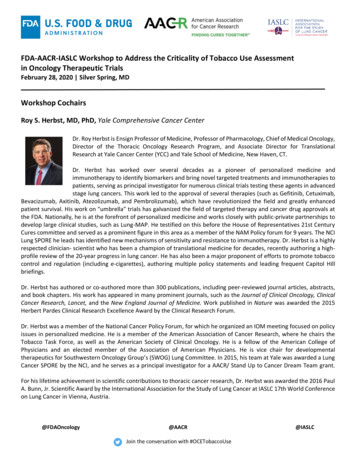
Transcription
FDA-AACR-IASLC Workshop to Address the Criticality of Tobacco Use Assessmentin Oncology Therapeutic TrialsFebruary 28, 2020 Silver Spring, MDWorkshop CochairsRoy S. Herbst, MD, PhD, Yale Comprehensive Cancer CenterDr. Roy Herbst is Ensign Professor of Medicine, Professor of Pharmacology, Chief of Medical Oncology,Director of the Thoracic Oncology Research Program, and Associate Director for TranslationalResearch at Yale Cancer Center (YCC) and Yale School of Medicine, New Haven, CT.Dr. Herbst has worked over several decades as a pioneer of personalized medicine andimmunotherapy to identify biomarkers and bring novel targeted treatments and immunotherapies topatients, serving as principal investigator for numerous clinical trials testing these agents in advancedstage lung cancers. This work led to the approval of several therapies (such as Gefitinib, Cetuximab,Bevacizumab, Axitinib, Atezolizumab, and Pembrolizumab), which have revolutionized the field and greatly enhancedpatient survival. His work on "umbrella” trials has galvanized the field of targeted therapy and cancer drug approvals atthe FDA. Nationally, he is at the forefront of personalized medicine and works closely with public-private partnerships todevelop large clinical studies, such as Lung-MAP. He testified on this before the House of Representatives 21st CenturyCures committee and served as a prominent figure in this area as a member of the NAM Policy forum for 9 years. The NCILung SPORE he leads has identified new mechanisms of sensitivity and resistance to immunotherapy. Dr. Herbst is a highlyrespected clinician scientist who has been a champion of translational medicine for decades, recently authoring a highprofile review of the 20-year progress in lung cancer. He has also been a major proponent of efforts to promote tobaccocontrol and regulation (including e-cigarettes), authoring multiple policy statements and leading frequent Capitol Hillbriefings.Dr. Herbst has authored or co-authored more than 300 publications, including peer-reviewed journal articles, abstracts,and book chapters. His work has appeared in many prominent journals, such as the Journal of Clinical Oncology, ClinicalCancer Research, Lancet, and the New England Journal of Medicine. Work published in Nature was awarded the 2015Herbert Pardes Clinical Research Excellence Award by the Clinical Research Forum.Dr. Herbst was a member of the National Cancer Policy Forum, for which he organized an IOM meeting focused on policyissues in personalized medicine. He is a member of the American Association of Cancer Research, where he chairs theTobacco Task Force, as well as the American Society of Clinical Oncology. He is a fellow of the American College ofPhysicians and an elected member of the Association of American Physicians. He is vice chair for developmentaltherapeutics for Southwestern Oncology Group’s (SWOG) Lung Committee. In 2015, his team at Yale was awarded a LungCancer SPORE by the NCI, and he serves as a principal investigator for a AACR/ Stand Up to Cancer Dream Team grant.For his lifetime achievement in scientific contributions to thoracic cancer research, Dr. Herbst was awarded the 2016 PaulA. Bunn, Jr. Scientific Award by the International Association for the Study of Lung Cancer at IASLC 17th World Conferenceon Lung Cancer in Vienna, Austria.@FDAOncology@AACRJoin the conversation with #OCETobaccoUse@IASLC
Michael E. Menefee, MD, U.S. Food and Drug AdministrationDr. Menefee is a medical oncologist on the thoracic and head and neck malignancies team in the Officeof Hematology and Oncology Products. He earned his medical degree from Meharry Medical Collegeand completed a residency in internal medicine at the Mayo Clinic. He went on to complete hisfellowship training in oncology and hematology at the National Cancer Institute. Prior to joining theFDA in 2018, Dr. Menefee served as an assistant professor of oncology at Mayo Clinic for 11 years. Hisclinical focus was on thoracic and endocrine malignancies and served as a clinical investigator onnumerous clinical trials. During his tenure at Mayo Clinic, Dr. Menefee also served as a permanentmember of the FDA Oncologic Drug Advisory Committee.Matthew Steliga, MD, Winthrop P. Rockefeller Cancer InstituteDr. Steliga is a thoracic surgeon specializing in thoracic oncology with an emphasis on lung cancer, andesophageal cancer. Dr. Steliga completed his training in 2009 and served as an instructor in theDepartment of Thoracic and Cardiovascular Surgery at M. D. Anderson Cancer Center in Houston. Hehas spent the past eleven years with the University of Arkansas for Medical Sciences (UAMS) and iscurrently the chief of the division of Thoracic Surgery. Dr. Steliga helped to develop lung cancerscreening at UAMS and is the collaborative physician lead for the smoking cessation program at UAMS.He has been actively involved in the IASLC and is the current chair of the IASLC Tobacco Control andSmoking Cessation Committee.Workshop Speakers and PanelistsSundeep Agrawal, MD, U.S. Food and Drug AdministrationDr. Sundeep Agrawal is a board certified medical oncologist and current medical officer at the FDA’sCenter for Drug Evaluation and Research, Division of Oncology 1. He completed his residency trainingat Drexel University College of Medicine in 2012 and completed fellowship in hematology andoncology at Washington Hospital Center/Georgetown University Hospital in 2016. He joined the FDAin September 2016. His area of focus is genitourinary cancers.Linda Bailey, JD, MHS, North American Quitline ConsortiumLinda Bailey, JD, MHS, is founder and CEO of the North American Quitline Consortium. The Consortiumis a membership organization that aims to maximize the access, use and effectiveness of tobaccocessation services offered through quitlines in the U.S. and Canada.Linda has a notable career in public health as an attorney, educator, and epidemiologist and a strongprofessional interest in influencing the development of science-based policies that promote health.Prior positions have included director, Center for Tobacco Cessation (at the American Cancer Society),associate director for the Center for Disease Control and Prevention’s Office on Smoking and Healthin Washington, D.C. (U.S. Department of Health and Human Services), senior advisor on health promotion and diseaseprevention at the Office of the Assistant Secretary of Health (HHS), study director at the Institute of Medicine, andepidemiologist at the Houston Health Department. She was also a faculty member at Johns Hopkins School of Public Healthand the University of Maryland School of Law. Linda holds a bachelor’s degree from Tufts University, a master’s degreefrom Johns Hopkins School of Hygiene and Public Health and a law degree from the University of Maryland School of Law.@FDAOncology@AACRJoin the conversation with #OCETobaccoUse@IASLC
Laura Bierut, MD, Washington University School of MedicineAs a physician scientist, Dr. Bierut has built a successful research program devoted to understandingthe genetics of nicotine use disorder. She served on the Advisory Counsel for the National Instituteon Drug Abuse (NIDA) and she is an active member of the NIDA Genetics Consortium, a group ofscientists leading NIDA’s efforts to understand genetic causes of substance dependence. She currentlyis a member of the FDA’s Tobacco Products Scientific Advisory Committee, and she is co-chair of theNational Comprehensive Cancer Network Smoking Cessation Guidelines workgroup. Dr. Bierut led theinitial studies that found that the α5 nicotinic receptor subunit gene on chromosome 15 increase asmoker’s risk for nicotine use disorder. These same genetic variants that contribute to heaviness ofsmoking are the strongest genetic influences on the development of lung cancer. As an active clinician, she is consistentlyrecognized as one of the Best Doctors in our region, and her goal is to capitalize on discoveries and carry them through toimproving treatment for our patients and population health.Paul A. Bunn, Jr, MD, FASCO, FACP, FAAAS, University of Colorado Cancer CenterDr. Bunn is Distinguished Professor and James Dudley Chair at the University of Colorado CancerCenter. He received his BA from Amherst College and MD from Weill Cornell Medical College. Hecompleted an internship and residency at UCSF and fellowship in medical oncology at the US NCI. Heserved as section head of the NCI-Navy Medical Oncology branch from 1975-1984, Head of the Divisionof Medical Oncology at the Univ. of Colorado from 1984-1992. He was Director of the Univ. of ColoradoCancer Center from 1986-2009. In the IASLC, Dr. Bunn served on the Board of Directors from 1988 to1994, President from 1997-2000, and CEO from 2004-2014. Dr. Bunn served on the Board of the ASCOfrom 1995-1999 and President from 2002-2003. Dr. Bunn has received the Karnofsky award fromASCO, the Hansen Merit award from the IASLC, the Sewall award from the Univ. of Colorado, PHS Medal of Commendation,among many other awards. The author of hundreds of articles, reviews and book chapters, Dr. Bunn’s research is wellknown in the cancer world focusing on novel therapies for lung cancer. From 1992 to 2019 he was the PrincipalInvestigator on the Specialized Program in Research Excellence in Lung Cancer (SPORE) grant funded by the NCI to expandunderstanding about the biology of the disease, as well as to find new methods of diagnosis, prevention and treatment.Dr. Bunn has led numerous national and local trials regarding the treatment of lung cancer, and his findings are creditedwith setting standards in the treatment of the disease.Priscilla Callahan-Lyon, MD, U.S. Food and Drug AdministrationDr. Priscilla Callahan-Lyon is an internist and pulmonologist. After 20 years of private medical practice,she joined FDA in 2008 as a medical reviewer in Center for Drug Evaluation and Research where sheworked extensively on nicotine replacement therapies. She moved to the newly formed Center forTobacco Products in 2012 and currently serves as Acting Director for the Division of Individual HealthScience in the Center’s Office of Science. Dr. Callahan is part of several cross-center groups within FDAthat are involved with nicotine policy and regulation including the Nicotine Steering Committee. Shealso serves as the FDA contact on the Tri-Agency workgroup (CDC, NIH, and FDA) focusing on smokingcessation.@FDAOncology@AACRJoin the conversation with #OCETobaccoUse@IASLC
Srikumar Chellappan, PhD, Moffitt Cancer CenterDr. Srikumar Chellappan is the Chair of the Department of Tumor Biology at the H. Lee Moffitt CancerCenter and Research Institute at Tampa, Florida. Dr. Chellappan obtained his PhD in Biochemistry fromthe Indian Institute of Science, Bangalore, India and did his post-doctoral training at Duke UniversityMedical Center, Durham, NC. After being an Assistant Professor in the Department of Pathology atColumbia University in New York from 1992-2001, he joined Moffitt Cancer Center, where he is atenured Professor and Senior Member. He was recognized as a Moffitt Distinguished Scholar in 2015.Dr. Chellappan’s research interests include signal transduction and transcriptional regulation,especially in the context of nicotine and smoking, cancer stem cells, tumor progression and metastasis.His laboratory has focused on how activation of nicotinic acetylcholine receptors affect the response of lung andpancreatic cancers to therapy. His research has been continuously funded since 1994 and his work has been published injournals like Nature Communications, PNAS, Journal of Clinical Investigation, JNCI, Stem Cells, Cancer Research etc. He iscurrently Molecular Cancer, Neoplasia and PLoS one, and has also served on more than one hundred NIH study sectionsand review panels of national agencies.Fumiko Chino, MD, Memorial Sloan Kettering Cancer CenterFumiko Chino, MD, is a cancer researcher and Assistant Attending in Radiation Oncology at MemorialSloan Kettering Cancer Center. Her research is focused on the financial toxicity of cancer care, healthcare disparities and access, patient reported outcomes, shared decision making, survivorship and endof-life care. Her work has been published in JAMA Oncology, Cancer, the American Journal ofManaged Care, and the ASCO Education Book. Her commentary on health care reform and cancer carehas been featured in JAMA Oncology, The Los Angeles Times and The Conversation. Her work has beencovered by national news media outlets including The New York Times, Forbes, and NPR. Shegraduated medical school (Alpha Omega Alpha) and completed residency at Duke School of Medicine(Chief Resident). She also served as the Teaching Value Fellow at the Costs of Care group, a global NGO focused onaffordability in health care. She has received research support from the Chanel Foundation and the Radiation OncologyInstitute. She has spoken across the US and internationally on the costs of cancer care.Carolyn Dresler, MD, MPACarolyn Dresler, MD, MPA, was trained at Memorial Sloan Kettering and the University of Toronto asa thoracic surgical oncologist with clinical practices at Washington University and Fox Chase CancerCenter. She retired in 2018 as the Associate Director for Medical and Health Sciences for the Office ofScience at the Center for Tobacco Products within the FDA. Prior to this she was the Director for theArkansas Department of Health Tobacco Prevention and Cessation Program. Before Arkansas, shewas the Head of Unit for Tobacco and Cancer at the International Agency for Research on Cancer inLyon, France. In 2002-2003 she completed a Master in Public Administration at the Kennedy Schoolof Government at Harvard University with an independent study in the human rights based approach to tobacco control.Her goal is to have fewer people dying from tobacco, specifically from tobacco-caused lung cancerNaomi Horiba, MD, MPH, U.S. Food and Drug AdministrationNaomi Horiba, MD, MPH, is a graduate of Tulane University Medical School where she also completedher public health degree and residency training in internal medicine. She performed her medicaloncology and hematology training at the University of Maryland Marlene and Stewart GreenebaumCancer Center and continued on as a faculty member for 6 years, subspecializing in gastrointestinalmalignancies. During that time, she participated in and co-authored numerous multicenter clinicaltrials. She maintains board certification in internal medicine and medical oncology. In 2015, Dr. Horiba@FDAOncology@AACRJoin the conversation with #OCETobaccoUse@IASLC
joined the U.S. Food and Drug Administration’s Office of Hematology and Oncology Products (now the Office of OncologyDrugs) as a medical officer and is currently serving as the scientific liaison for gastroesophageal and hepatobiliarymalignancies.Adnan Jaigirdar, MD, U.S. Food and Drug AdministrationDr. Jaigirdar currently is an Acting Team Leader for the Thoracic, Head and Neck Oncology Team inthe Division of Oncology 2, OOD, CDER, FDA.He completed his surgical oncology training at NCI, and prior to joining the FDA in 2016, Dr. Jaigirdarwas a surgical oncologist at the Walter Reed National Military Medical Center, Fort Belvoir, and aClinical Assistant Professor of Surgery at the Uniformed Services University of the Health Science(USUHS). For the past few years at the FDA, his work has been focused in the review of investigationalbiologic and combination advanced therapies, including cell and gene therapies, in solid tumors.Paul Kluetz, MD, U.S. Food and Drug AdministrationPaul Kluetz is a medical oncologist and Deputy Director of the Oncology Center of Excellence (OCE) atthe U.S. FDA. His interests include trial design and endpoint selection to expedite drug developmentand define clinical benefit in oncology trials. His work has included the initiation and direction of theOCE’s patient-focused drug development program. This program has been instrumental in leadingFDA’s efforts to review, analyze and communicate clinical outcome information from patient reportedoutcomes (PRO), wearable technologies, and other methods to measure symptoms and function inboth the clinical trial and “real-world” settings. He has also worked to advance patient-friendly trialdesigns including pragmatic and decentralized trials, as well as contributed to broader FDA efforts toexpand trial eligibility criteria. In addition, Dr. Kluetz is leading Project Renewal, an OCE pilot project developing asystematic process to review accumulated evidence in order to update the product labels of longstanding cancertherapies. Dr. Kluetz remains clinically active, caring for patients and supervising medical residents at the GeorgetownUniversity Hospital.Stephanie Land, PhD, National Cancer InstituteStephanie Land is a Program Director and Statistician in the Behavioral Research Program TobaccoControl Research Branch (TCRB) at the National Cancer Institute (NCI), with a secondary appointmentin the NCI Coordinating Center for Clinical Trials. Her areas of focus are tobacco use among patients inthe settings of cancer prevention, screening, treatment, and survivorship. She is a member and pastchair of the Division of Cancer Control and Population Science Clinical Trials Coordination Group andthe NCI Clinical Trials Stewardship Committee. Formerly, she was a member of the NCI Special StudiesInstitutional Review Board, Associate Editor for the Journal of Clinical Oncology, and a member of theCPCRN Tobacco/Lung Cancer Working Group, and chair of the NCI-AACR Cancer Patient Tobacco Use Assessment TaskForce.She serves on the American Association for Cancer Research (AACR) Tobacco and Cancer Subcommittee and is a memberof the National Lung Cancer Roundtable. She is the NCI lead for the Smoking Cessation At Lung Examination (SCALE)Collaboration, a collaboration that will share data and methods across eight funded projects to pursue research oncessation interventions that are efficacious and feasible in lung cancer screening clinics. She is also the NCI lead for theCancer Center Cessation Initiative (C3I).Before joining NCI in 2011, Dr. Land was an Associate Professor of Biostatistics at the University of Pittsburgh. From 19992011, she was a statistician in the National Surgical Adjuvant Breast and Bowel Project (NSABP), an NCI-funded clinicaltrials cooperative group that conducted multi-center phase III trials for breast and colorectal cancer. She also collaborated@FDAOncology@AACRJoin the conversation with #OCETobaccoUse@IASLC
with members of the University of Pittsburgh Cancer Institute Lung and Thoracic Malignancies Program from 1999-2011and served as the lead statistician for the Lung Cancer Specialized Program of Research Excellence (SPORE) from 20022011. Dr. Land earned a doctorate in statistics from Stanford University.Shakun Malik, MD, National Cancer InstituteShakun Malik is Head, Thoracic Cancer Therapeutics, Cancer Therapy Evaluation Program (CTEP),Division of Cancer Treatment & Diagnosis, National Cancer Institute (NCI). She joined the CTEP inNovember 2013. Her goal is to facilitate lung cancer research. Prior to joining CTEP, Dr. Malik workedat the U.S. Food and Drug Administration (FDA), where she gained valuable experience inunderstanding the regulatory pathways that make drugs available to patients.Dr. Malik has extensive clinical background. She currently performs clinical work one day a week atthe NCI Clinical Center, and has worked as an Associate Professor of Medicine in the Department ofHematology/Oncology at the Georgetown University Hospital. She has served as the Chief of Center for Thoracic Oncologyand Director of Multi-Disciplinary Thoracic Oncology Clinic at the Lombardi Cancer Center, and also worked as an associatein a Phase I program of drug and developmental therapeutics.Dr. Malik graduated from of The University of Kashmir, India, and completed her hematology/oncology fellowship at TheGeorg
Science in the Center’s Office of Science. Dr. Callahan is part of several cross -center groups within FDA that are involved with nicotine policy and regulation including the Nicotine Steering Committee. She also
